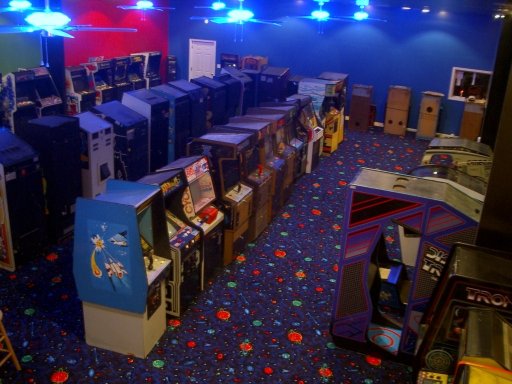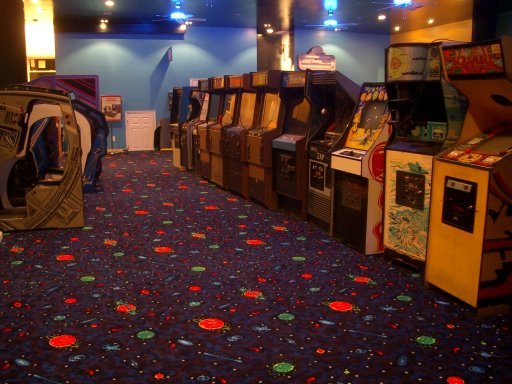I don’t just get into something; I tend to live it, breathe it and eat it, for weeks on end, then move away to something else with that passion. These days, there’s been a lot of Halo 3 multiplayer happening.
It sounds almost sad to one segment of my audience; hours spent with a game? But in this case, there’s a lot to it I’ve been enjoying and a lot I’m observing now about the current state of communication and technology. It works for me.
I have been told of other, superior programs and of course many more will come along, but there’s a slight bias on my part that I won’t play (or don’t enjoy playing) realistic portrayals of wars the world has actually lived through. When the armor is real and the other team’s language is a real one currently in use and the locations are based on actual places where some very good people died, often for no reason, it’s just not my thing. So no Call of Duty 4 or America’s Army for me, thanks.
In Halo 3, it’s essentially insane paintball, with returns to service and a crazy tracking system. For example, you can see my entire history of playing this game online, updated within 2-3 minutes of each time I finish a game. And the amount of information up there is gigantic: which weapons I prefer, how I tend to do in different locations, how I tend to be killed or kill. And honestly, my entire game history! It’s astounding they’re keeping this on every player, in toto, and all the interrelationships from it.
(That also shows you my Xbox “Gamer Tag”, Sketch the Cow. There’s a story behind that name, which I’ll probably dump out in my next enty.)
The game itself attracts me because depending on the players involved, it can be a complicated tactical experience or a complete and utter rout. And to be honest, it’s the addition of the voice aspect that makes it particularly compelling to me.
The game uses voice communication extensively; everyone can chat before the game, and during the game a team can send messages among themselves, devising on-the-spot strategy. Congratulations can occur during or after the game, and in a few cases you can even learn a little more about the other players than you might expect, like where they’re from or why they’re awake at a given hour.
Or, and this is much more likely, more likely than Bungie (the creators) or Microsoft (the console makers) would want to admit… it goes into a massive, decimating clusterfuck.
The game is rated M for Mature, which means it’s supposed to be for people 17 or older. This is a lie and garbage in actuality; cascades, no, torrents of children are on this game, children who are obviously unable to drive a car, venture more than a mile or two from home, or possibly across the street. They are young, they are very high-pitched, and they are more than willing to explain to me, in stumbling-syllable fashion more suitable for a swing set, how they are going to kick my ass.
The majority, of course, seem to be in the 18-22 year old range, young men primarily, full of energy and life and also prone to the wild mood swings of the unnecessarily prodded slacker variety. I’ve had the pleasure of listening to them actually compare and contrast availability of drugs in the southeast versus central United States, obliterating whatever small amount of tactical response they might have otherwise been incapable of. Naturally, this is a contrast of priorities between them and me, and I am at peace with that. I do not need to know which bag of what costs what.
I am also struck anew, in nearly every evening of playing, how completely randomly various epithets are thrown out into the air in response to perceived wrongs. Just as the world of networked computers have enabled us to know rather comprehensively what hardware is popular and what configurations are most likely to be used, so too will a person playing Halo 3 discover the veritable rainbow of definitions for the word fag. I’ve heard it used as a noun, a verb, and an adjective. Subsequent to the noun usage, I’ve heard it to mean (I believe), “poor player”, “player using a powerful weapon over and over”, “excellent player”, “player who just said something you don’t agree with, and, ultimately, “player”.
I keep thinking that I will eventually grow inured to this, this consistent mutation of homophobic language used as a direct swap-in for the term huckleberry, but I just don’t. I’ve tried to stand up against this perceived problem, ideally to change some minds, but to call it ineffectual is an insult to things that are ineffectual. This is in fact an impossible-to-repair situation. I think it’s endemic to the entire process of growing up in society now; to the vast majority, you insult someone by implying they are homosexual, or that they are showing, in some way, the obvious inferior traits of homosexuals. It is so rampant it may have actually lost its original meaning. Or maybe not. Either way, I could see why a truly queer person would be inclined to stick a pen knife into his own neck. The fear and shame must be smothering. So thanks, Halo 3 by Bungie Studios, I appreciate this life lesson you’ve given me.
Another excellent situation is when I reveal, in the process of normal conversation during a game, that I am 37. You would think this would be minor trivia, but on several occasions I have been greeted with a barrage of profanity from another team player or random conversationalist indicating how horrible it is that I am playing Halo. This may sound off the wall, but I am talking about actual umbrage and outrage that someone so old would be playing. This is then followed up with speculative language about my life, my priorities, my time management, and my quality of existence. That I am playing such a game in a house I bought with a car parked outside that I bought on a massive TV I bought and none of these involve the direct involvement of my parents is apparently a crime. Who knew! Thank you again, Bungie Studios and Microsoft.
But I am downplaying, of course, the heights of this experience.
I am sometimes thrown among people having a genuine good time. Sure, one might apparently use random racial epithets as frequently as you or I might use the word “that”, and another might be, in actual life, a dope. But their words are warm, encouraging phrases and right-on shouts of happiness as the team accomplishes something. Recently, it was somewhat relevant to my “rank” in the game that I achieve a win, taking my number from 299 to 300. I mentioned this, and throughout the game, a person I didn’t know, who I’d never met before, would be shouting for everyone to go the extra mile, to “get Sketch his 300”. This is a very special thing, to hear this fellow wanting me to achieve something in the game, something he wouldn’t in a million years benefit from, but who was doing it so my enjoyment was that much more. That’s very special. And those special things happen all the time, patchworked within the bad.
My heart will sink, my evening tarnished, to have a directed, unstopping personal attack waged upon me by a random knob. But my heart will lift to find myself among a randomly assembled gang of players chanting “nerves of steel” or “good job” upon one of us accomplishing a particularly skillful move. It is a base feeling, an instinctual one; getting along, feeling bonded, moving forward. That this comes out of a game is an amazing thing. That I will likely never meet a single one of them, could never hope to, is the dark cloud that runs through the bright day, like the knowledge of remembering the dug hole waiting for you at your ultimate end. But in the moment, the moment these games have been designed to keep going as long as you possibly can, it is sublime.
We have come a long way from “Zaxxon”.
5 Comments




